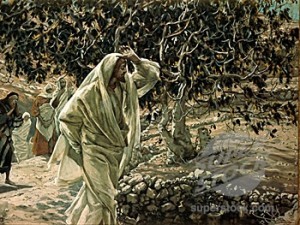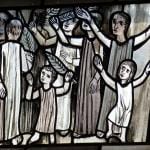For those unfamiliar with the liturgical calendar, the Sunday and feast day assigned readings rotate through a three-year cycle, each yearly cycle beginning with the first Sunday of Advent. This year the Holy Week gospel texts are from John which, to be honest, doesn’t make me happy. Some people claim to love John’s gospel the most, but I’m not one of them. The Jesus of the Gospel of John loves to pontificate and sounds a lot more like a theologian than a regular person. Give me instead the Holy Week narratives of the synoptic gospels. Consider, for instance, the following fascinating story from Matthew.
 One morning early in the week between palm Sunday and Easter, after spending the night with Mary, Martha, and newly-raised-from-the-dead Lazarus in Bethany, Jesus and his posse (the “boys,” as Jesus calls the disciples in “The Chosen”), are taking a morning walk to Jerusalem. Jesus is hungry, sees a fig tree, and plans to have a breakfast snack. But, as Matthew tells us, “He came to it and found nothing on it but leaves.’ So Jesus curses the tree, “and immediately the fig tree withered away.”
One morning early in the week between palm Sunday and Easter, after spending the night with Mary, Martha, and newly-raised-from-the-dead Lazarus in Bethany, Jesus and his posse (the “boys,” as Jesus calls the disciples in “The Chosen”), are taking a morning walk to Jerusalem. Jesus is hungry, sees a fig tree, and plans to have a breakfast snack. But, as Matthew tells us, “He came to it and found nothing on it but leaves.’ So Jesus curses the tree, “and immediately the fig tree withered away.”
My goodness. I can imagine the disciples as the events unfold—several are trying to point out that this isn’t fig season, Andrew offers Jesus a bite of his bagel, Judas is looking in the community purse to see if there’s enough to buy Jesus some breakfast at the coffee shop just inside the city gates, and Peter is going into immediate damage control. “What happens at the fig tree stays at the fig tree, right? Right??”, but Matthew is already making mental notes to put into his memoir later.
Imagine the stir if this happened today with 24-7 media coverage. “Jewish Holy Man Kills Innocent Tree in a Fit of Temper.” “Figtreegate.” Environmentalists would be outraged, talking heads from anger management therapists to tree-friendly carpenters to Pharisees to a cult of fig-worshipers would debate the topic on FOX, CNN, and MSNBC. Everyone would be trying to get an interview with Jesus, but no one’s gotten an interview with him ever, not even Rachel Maddow or Tucker Carlson. Peter, the spokesman for the group, tells some convoluted story about Jesus doing it as an illustration of what any of us can do with just a tiny bit of faith, but that sounds like a lot of spin.
In such situations, there’s always someone who is looking for fifteen minutes of fame, claiming to have seen exactly what happened.
- As part of our continuing coverage of Figtreegate, we’re talking with Fred bar-William, a local Jerusalem tanner. Fred, you were an eyewitness to what happened at the fig tree, right?”
- Yeah, man, I was just sort of hangin’ around to see what was goin’ on, him being famous and all. He stopped with a bunch of guys by the tree—I couldn’t hear everything, but he was obviously pissed and dropped an F-bomb or two on the tree, then went on and stopped at the coffee shop a ways down the road. I thought that was kinda harsh, and now look at it—it’s all, like, withered up and disgusting. I mean, we knew the guy had a temper with what happened in the temple market yesterday, but this is ridiculous. Like, you’d think a guy from the sticks would know when it’s fig time and when it ain’t.
The writer of Ecclesiastes and the Byrds remind us that “To everything there is a season, a time for every purpose under heaven.” But seasons work differently in different places and times are unique to each person. Things started blooming in February when we lived in Memphis three decades ago, but the trees here in New England in early April are just getting ready to bust out their flowers and leaves. And they’ll do it at the time that’s natural and right for them. This is something that Jesus seems to forget during Figtreegate. Trees, and we for that matter, are like the Goldilocks story, where each tree, and each one of us, survives through seasons of winter; we bloom in our own way only when things are “just right.” Those who are “happy indeed,” claims Psalm 1,
Are like a tree that is planted
Beside the flowing water
That yields its fruit in due season
And whose leaves shall never fade;
And all that they do shall prosper.













